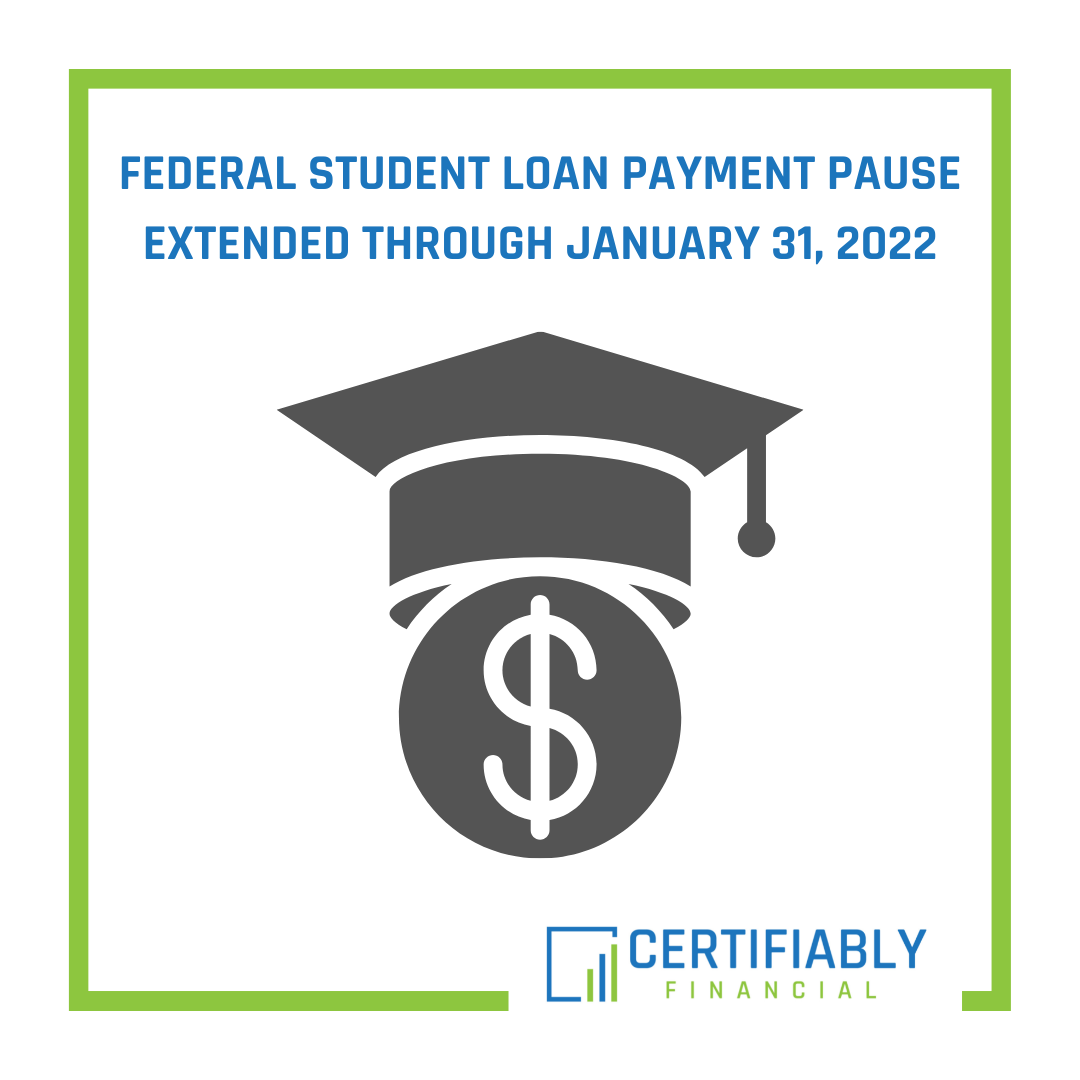Over the weekend I spoke to a friend who graduated from physical therapy school earlier this year. He didn’t have any help with school expenses and graduated with $160,000 in student loans. To his benefit, he’s pretty frugal and has a good natural sense about money. However, $160,000 is a really big number and it has him worried. He’s been asking himself if he’s going to be able to be okay with that amount of debt and whether the right decision is to pay down the debt as quickly as possible or if he should save for retirement as well.
Student Loans
Federal Student Loan Payment Pause Extended Through January 31, 2022
Federal student loan payments have been paused since March 2020. As of August 6, that pause has been extended “one final time” through January 31, 2022. What this means is that Federal student loan payments will not be required until February 2022 and that interest on these loans will not accrue during that time.
Should I Refinance My Student Loans?
Similar to mortgage interest rates, student loan interest rates have been dropping this year. That decrease in rates, along with the pause in payments and interest accrual under the CARES Act, has led many to wonder whether they should be doing something with their student loans. One of those options is whether or not to refinance them.
Back to School: Student Loan Edition
Last week, Amanda was faced with a significant financial decision that millions of others have had to face as well without ever having any education or guidance on what they should do: take out student loans for the next year of college or figure out how to pay for it out-of-pocket? From the perspective of a financial planner, this process was completely not transparent. Luckily, Amanda knows a guy.
Student Loan Deferment
The college class of 2019 has graduated and now is off to the real world. Many of these former students have loads of student debt that most of them aren’t contemplating how to deal with yet. Undoubtedly, most of these graduates will also elect to take the 6-month allowable deferment (grace period) on Federal Stafford student loan payments and (pretend to) forget about them until judgement day comes in the form of a bill.
4 Ways to Save for Your Child’s College Education
4 minute read
Before you ever consider paying for your child’s college education, you need to first make sure that you’re taking care of your own financial situation. This is sometimes an unpopular opinion among parents, but one that’s very popular among financial planners. I get it, they’re your pride and joy and you want what’s best for them. But sometimes you have to think about yourself first.
We all know about how student loans are affecting the finances of younger generations, but there will be resources (yes, including student loans) available to your children to help them pay for college. On the other hand, if you’re forced to quit working due to a disability or health problem, or you reach the age that you’d like to retire, there’s not much that you can do if you spent the money that you need to retire on putting your children through college.
Placing paying for your child’s college education above your own financial situation could lead to you not reaching your own goals and having to sacrifice later in life, or potentially even work longer than desired.
I don’t think that everyone needs to (or should) go to college, but I’m sure a lot of people will still attend college in the future and many jobs will require it. What if you save a hefty amount for your child’s college education and they don’t go to college, though? What if they receive a scholarship? Where should you save for college (if you’ve already made sure that you’re taking care of your future self) anyways?
If you’ve taken care of yourself, and you have the capacity to do so, here are 4 options to save for college education:
529 Savings Plan
A 529 plan is a tax-advantaged education savings plan in which you can invest money. Investments within a 529 grow tax-deferred and the money can be pulled out tax-free, if used for qualified education expenses. The money that you save within a 529 can be used for qualified education expenses at colleges and universities, vocational and technical schools, and even primary and secondary education, as of 2018. (Note: Refer to the rules of the 529 plan that you use for specific guidance on what is considered a qualified education expense and what institutions qualify).
In Indiana, contributing up to $5,000 to a 529 plan will provide you with a 20% state tax credit, up to a maximum credit of $1,000 ($5,000 x 20%). That’s a pretty good incentive, but what if you save into the account and your child doesn’t go to college? You can change the beneficiary of the account to another eligible family member, pull out the money and pay the taxes due plus a 10% penalty, or wait and save it for later. If your child receives a scholarship, then you can pull out funds up to the amount of the scholarship penalty free, but you’ll still be responsible for paying the taxes on the earnings.
529 plan contribution limits are very high (up to $450,000 per beneficiary in Indiana) and vary by state. However, a contribution over $15,000 in 2018 ($30,000 for married couples) could cause gift tax consequences. Still, you’re able to make a lump-sum contribution of 5 years’ worth of contributions ($150,000 for married couples) in one year and avoid any potential gift tax consequences.
Roth IRA
If you don’t want to have to worry about your child not going to college and how you would deal with the money in a 529, then you could use a Roth IRA as a pseudo college savings account. However, there are a few potential limitations to using a Roth in this manner.
First, you would end up pulling money from a retirement savings account with great tax advantages that you may want to keep for retirement. Secondly, those under age 50 can only contribute $5,500 to a Roth IRA in 2018 ($6,000 in 2019). Those over age 50 have an additional catch-up contribution of $1,000 for a total contribution of $6,500 in 2018 and $7,000 in 2019. You must have earned income of these amounts to be eligible to contribute them to the account.
Additionally, there are income phase-out limits to contributing to a Roth. In 2019, those who earn $193,000 or less and file their taxes as married filing jointly ($122,000 for those who file as single) can contribute up to the limit. However, those who earn more than $193,000 ($122,000 for single) begin to be phased out of making contributions and those who earn $203,000 ($137,000 for single) or more are not eligible to contribute to a Roth.
The positive side of contributing potential college savings to a Roth is that you can pull out contributions (not earnings) from a Roth IRA to pay for qualified college education expenses without penalty or being taxed, if you’re under age 59 ½. If you’re over age 59 ½, and have had a Roth open for 5 years, then you can pull out contributions and earnings tax and penalty free. If your child doesn’t go to college, then you just keep the money in the account for your retirement or to pass on to your heirs.
Taxable Account
You could simply save into a checking or savings account for your child’s college education. However, you run the risk of your money losing purchasing power to inflation. Alternatively, you could open a brokerage account and choose an investment allocation for the money. This would be similar to saving to a Roth in that you could keep the money in the account and use it for retirement if your child does not attend college. However, if they do attend college, then you would be taxed on any gains that you recognize when selling securities to raise cash to pay for college education expenses.
Cash Flow
If you have, or believe that you will have, a significant enough income that will allow you to continue to save, reach your goals, and also pay for your child’s college education, then you may be able to cash flow the expense once the time comes.
There are multiple strategies for saving for college education expenses, including combining those strategies mentioned above, but there isn’t a one size fits all approach. One thing that is very important to keep in mind is that you need to take care of yourself before worrying about paying for your child’s college educations.
Avenues will be available for them to pay for college, but you can’t go back and press redo on saving for retirement.
The Potential Hidden Cost of Student Loan Forgiveness
2 minute read
PSLF is available to those who work in government or not-for-profit and make 120 consecutive qualifying monthly payments towards their student loans. There are a lot of details around this, but those are for another day. Check the PSLF link above if you’re interested in learning more. To be eligible, an individual must complete the PSLF Employment Certification Form for each year that they worked for an eligible employer and made eligible payments. If all of the requirement are satisfied, then any remaining federal student loan balances will be forgiven.
Income-driven repayment plans tie your student loan payments to your income. If you fulfill all of the requirements, including recertifying annually, then any remaining federal student loan amount at the end of 20-25 years (depending on payment plan) will be discharged.
Keep in mind that these programs are for Federal student loans. You’ll likely end up being responsible for paying all of your private student loans yourself, even if you work for the government or a nonprofit.
Currently, any loans that are forgiven under PSLF are not treated as taxable income. However, loans discharged under the income-driven repayment plan options after 20-25 years of payment are treated as taxable income in the year that they’re forgiven. This is something to be aware of since laws always change and there has been some discussion about this topic recently.
For example, if someone had $100,000 of student loans forgiven under PSLF, then they would not have to pay any taxes on that amount. However, if someone were in the 24% tax bracket and had $100,000 of student loans discharged under a repayment plan, then they could have an extra $24,000 of taxes to pay in that year.
Before using these programs, you should run the numbers to see if it’s worth utilizing them. You could actually end up paying more in payments and taxes than if you were to just pay the loans off more quickly.







